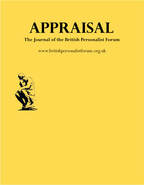|
|
Appraisal Volume 13, No. 1, Spring 2023ISSN 2514-5584
EditorialR. T. Allen
This issue begins with three full papers from our very successful Zoom Conference in November 2022. We had twice the number of persons attending (Not 'attendees', please!, because they attend and are not attended: cf. 'employees' and 'employers') our previous events. Although we had only four papers, the discussions filled the 30 mins. for the discussion of each of them. The author of the fourth paper could not complete it in time for inclusion in this issue but we may be hope to include it in the next issue in the Autumn.
First, Diana Prokofyeva from St Petersburg argues that Higher Education today is too much regarded as something to be 'consumed' (even on the BBC I have heard of 'consuming music'), and that in disjointed bits of information, and so is losing its humanistic mission of enlarging the minds of its students. I find that this is certainly true of what is happening in Britain where university study is primarily valued in terms of its financial outcomes in terms of likely salaries and wages for graduates. So, what if graduates do not take up employment which requires a degree? Even if they have not acquired or depended an interest in some branch of knowledge or in literature or music, which can last a lifetime, they should have become to think in a more rigorous and disciplined manner and to be more discriminating (a dirty word these days!) between among the deep and the shallow, the genuine and the fake, and the fashionable and the permanent. This 'inversion of values' occurs elsewhere. When a new economic project is proposed, it is valued in terms of the jobs that it will create, rather than the primary one of whether or not it will be profitable. Next, Henrieta Serban from Bucharest traces connections between neo-pragmatism and Personalism, the former having a wider range of desirable outcomes than classical pragmatism and thus approaching a personalist outlook. In particular she explores convergences between Peirce and Husserl. In the third article, Richard Prust from North Carolina, gives us the 'Introduction' to his forthcoming book, Personal Meaning: How We Give Relational Significance, Relative Importance, Emotional Force and Moral Value to Our Action, in which he seeks greatly to enlarge the terms by which we actually give meaning to our actions and seek to discern them in relation to the actions of others. In particular, he contrasts this richness of meaning with the poverty of meaning in the 'behavioural sciences'. Finally, we have reviews of three books of a personalist tenour: Henerieta Serban's bilingual Neopragmatism and Postliberalism: A Contemporary Weltanschauung. Giorgio Baruchello's and Ársæll Már Arnarsson's Humour and Cruelty Volume 1: A Philosophical Exploration of the Humanities and Social Sciences. And Juan Burgos' Intoducción al Personalismo, translated by myself with the assistance of the author and James Beauregard. R. T. Allen
Future Issues and ConferencesLater in 2023: Special Additional Issue of Appraisal: ‘Responses to Juan Manuel Burgos’ Introduction to Personalism, and the Author’s replies to them, collected by James Beauregard. 131 pp. October 28th: Zoom Conference: Deadline for submissions :12th August. November/December: Publication of Appraisal, Vol. 13, No. 2, Autumn, 2023. Appraisal Vol. 13, No.s 3 and 4, 2024, Special Features on ‘Personalist Anthropology’. Possible residential Conference in June/July 2024 with session on ‘Personalist Anthropology’. Note: ‘Philosophical Anthropology’ is an established discipline in Continental Europe but is unknown in the English-speaking world, where only philosophy of mind has been pursued but it has included the ‘Mind-Body Problem’. In contrast, Philosophical Anthropology considers the whole person, thinking, feeling, desiring, acting, social, etc., and, in contrast to empirical anthropology, it considers what is universal and necessary to being a person. John Macmurray’s, The Form of the Personal: Vol. 1, The Self as Agent, and Vol 2, Persons in Relation, and Raymond Tallis’ trilogy, The Hand, The Knowing Animal, and I Am, are definitely examples of Anglophone Philosophical Anthropology, but are not currently ‘mainstream’. Charles Taylor’s The Sources of the Self, and Philosophical Papers, could also be mentioned. |
Proudly powered by Weebly

